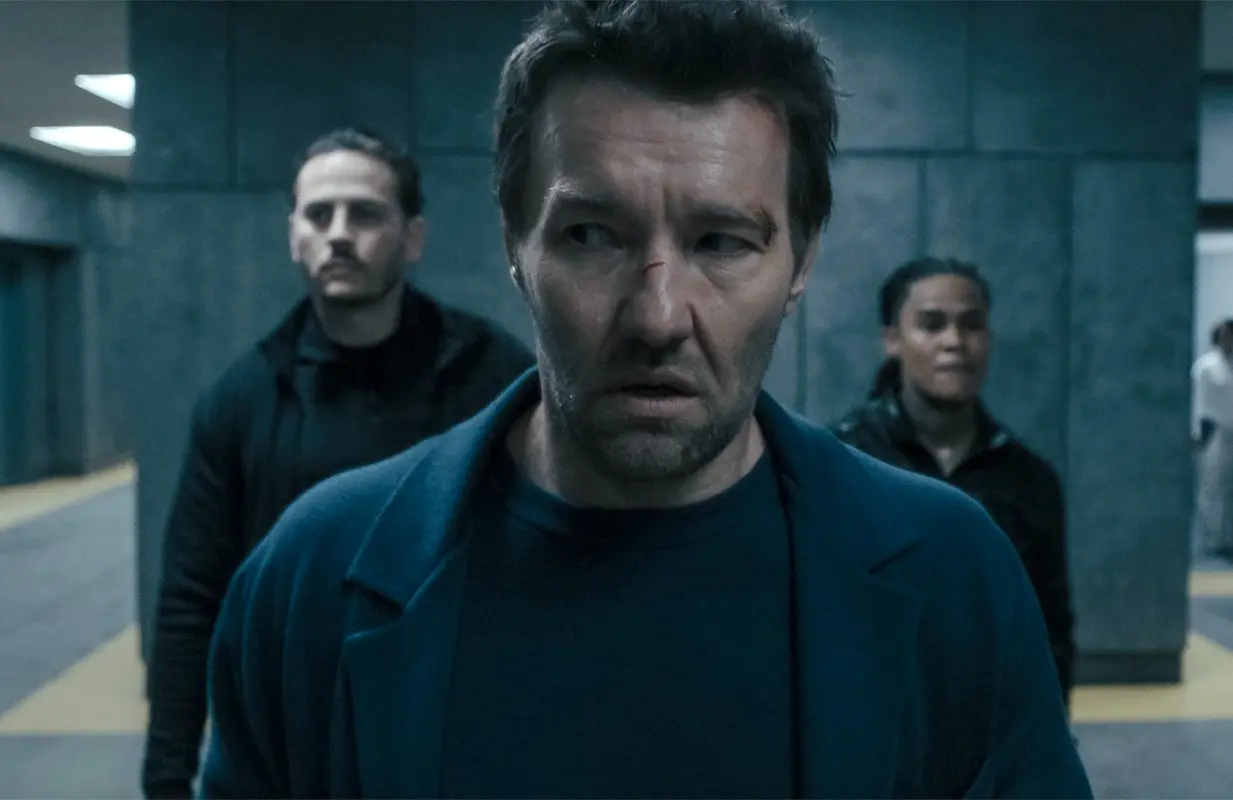Joel Edgerton Walks the Fine Line Between the Surreal and the Human in Dark Matter
-
 Joel Edgerton in Dark Matter (Photo: Apple TV+)
Joel Edgerton in Dark Matter (Photo: Apple TV+)Chances are that even those uninitiated in the mind-boggling principles of quantum physics have heard of Schrödinger's Cat. In layman’s terms, the groundbreaking thought experiment demonstrated how tiny particles can exist in two states at once until they’re observed. If you put a cat in a box with something that could kill it, the cat is both dead and alive for as long as the box remains unopened.
Pardon the brief foray into brain-melting physics, but it helps to walk into Apple TV+’s Dark Matter aware of Schrödinger and his history-making cat. It is precisely this experiment that Professor Jason Dessen (Joel Edgerton) maps out to a mostly bored bunch of college students. Jason, it turns out, could have been a big shot scientist had he not fallen in love — and decided to have a child with — beautiful artist Daniela (Jennifer Connelly), who also gave up her dreams of making it big in the art world once their son Charlie (Oakes Fegley) unexpectedly came along.
Jason doesn’t have a bad life. He has a beautiful wife and teenage son, a brownstone in the heart of Chicago, and a steady job that keeps the family’s heads way above water despite not paying the big bucks. Still, frustration is certain to come knocking when a seed of doubt is given time and space to grow, and Jason’s very own sense of unfulfillment is taken to a breaking point when his old university colleague is awarded a prize equivalent to the Nobel in physics. It is while leaving the friend’s celebratory drinks that Jason is violently whisked away into an alternative reality, kicking off the Schrödinger's puzzle at the center of this brilliantly executed adaptation of Blake Crouch’s eponymous best-seller.
It is no easy feat to create a sci-fi revolving around complex laws of physics without alienating audiences with long-winded dives into the teensiest details of the whys and hows. And this is why Dark Matter works so well as a genre offering: We know from the get-go that, according to science, things can exist in two places at once. The fact is established early in the pilot without the need for further elaboration or convoluted montages in which you can almost sense the grueling hours of labor it took the actors to memorize three pages of theory. The pilot is also cleverly structured to tell the audience exactly what the show is about without giving away much of its secrets, allowing the space for a certain smugness for those who catch the initial trick without depriving them of surprises as the episodes pile on.
Australian hunk Edgerton may seem an odd casting for a dull professor whose definition of risk is a patterned cardigan, but the choice pays off once the show’s doppelganger premise becomes clearer. As the lines between good and evil become murkier and murkier, Edgerton is allowed to step into the quietly menacing nature of his previous roles in films like Paul Schrader’s Master Gardener and the Aussie’s very own directorial effort, The Gift. The actor is at his best whenever dialogue is sparse, the camera lingering on his rugged face as it tells a story of grief, anger, and longing. These three sentiments are the guiding narrative forces of Dark Matter, and the show is rarely better than when Edgerton manages to evoke raw emotion while trapped in a fairly ludicrous fictional wormhole.
The series remains mostly faithful to its source material (Crouch is one of the writers and executive producers), and all significant changes contribute not only to the show’s pacing but also grant its characters richer inner lives, explored in welcome detail in the course of nine hour-long episodes.
Perhaps the greatest change of all comes in the form of Amanda (Alice Braga), who is Jason’s psychiatrist and accidental sidekick in the book but a much more complex part of the story in the show. Here, Amanda is the third corner of a thorny love triangle born not out of a hormone-fueled desire but a more sorrowful pining for memories once shared and suddenly gone. While the book’s Daniela is Spanish to Connelly’s very much American version, Amanda is made Brazilian in the series — like Braga herself — adding yet another layer to that deep, soulful longing for a home that was once there but now seems to no longer be a place one can return to.
Mindhunter composer Jason Hill pens the blood-pumping synth score for the show, seesawing between amping the tension of the central game of cat and mouse while also capturing the story’s eerier undertones. Whenever Dark Matter steps into CGI-heavy territory to take the viewer into its fantastic alternative worlds, the score is there to ground the story into very real, very familiar human emotions — fear, dread, excitement. As for the CGI itself, much like with the science fundamentals, the series avoids overdoing the special effects, another clever choice that brings Dark Matter closer to home and, therefore, makes it so much more effective.
The show’s smaller bumps are easily overlooked. A few loose ends around the halfway point threaten to curb the story’s well-paced rhythm, but never fully trip this captivating offering that understands like few others how to walk the fine line between the surreal and the human.
Dark Matter premieres May 8 with two episodes on Apple TV+. New episodes drop every Wednesday.Rafa is a film programmer and journalist with words on Variety, BBC Culture, Sight & Sound and more. You can find her @rafiews.
TOPICS: Dark Matter (Apple TV+ Series), Apple TV+, Alice Braga, Blake Crouch, Jennifer Connelly, Jimmi Simpson, Joel Edgerton, Oakes Fegley, Science Fiction